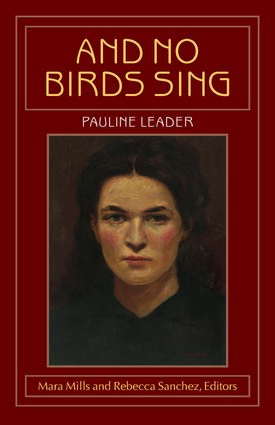
This is a reissue of a memoir published in 1931, featuring a new scholarly introduction.
Description
Originally published in 1931, this memoir offers an unflinching look at the life of a deaf woman struggling with poverty and isolation in the bohemian enclave of Greenwich Village. In harrowing yet lyrical prose, Pauline Leader recounts her experience growing up as the daughter of Jewish immigrants in a small New England mill town. Born in 1908, Leader was exposed to frequent verbal and physical abuse. She became deaf at the age of 12, following a long illness. As a teenager, she ran away to New York City, where she found work in factories and sweatshops, and spent time in a home for “wayward girls.” As she sought community among the artists and eccentrics of the Village, Leader’s strong will and fierce independence were often thwarted by hardship and self-doubt. But through it all she found solace in her writing.
This edition is accompanied by a new introduction and afterword that provide a scholarly framework for understanding Leader and her times. She persevered and became a published poet and novelist, often drawing on the experiences offered up here. Compelling and evocative, And No Birds Sing deftly reveals a complex, intelligent spirit toiling in a brutal world. From the book:
I insisted to myself that I could still hear. I heard in my mind the sounds of streams as I passed them. I knew the sound the river made, that river that I had known always, the river by the marble house. In my mind the river washed with a low intimate sound. I had no need to hear as the people heard. True intimacy needs no ears. I knew the sound of birds; I heard them as they hopped about. I knew the sound of words also. It was words that I most intensely heard. I had not always the river and the birds—they appeared far away at times. I did not always want river and birds, but I always wanted words, and I always had them. I would have been terribly lonely without them. With them always in my mind, I could not be truly lonely. I played with them; I set them to music; I achieved endless variations with them. They were never weary, as other things could sometimes be weary.
Pauline Leader (1908–2001) was a poet, short story writer, and novelist. Her second book, A Room for the Night, was published in 1946.
Reviews
"Leader’s memoir is remarkable. Vividly depicted, at times achingly so, this work invites additional historical engagement...Cumulatively, this memoir offers a poignant depiction of the damaging power of ableism and audism, among other oppressive systems. Its insistent call for recognition reminds us in deaf and disability studies, too, of the need for more expansive understandings of lived experiences...This work may be a useful addition to the reading of multiple audiences, including undergraduate and graduate classes in deaf and disability history, critical ethnic and gender studies, literary studies, and broad US history courses."
— Susan Burch, H-Disability, H-Net Reviews